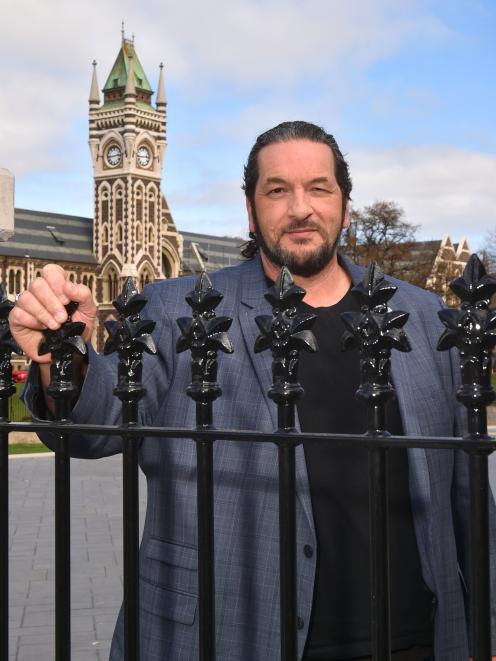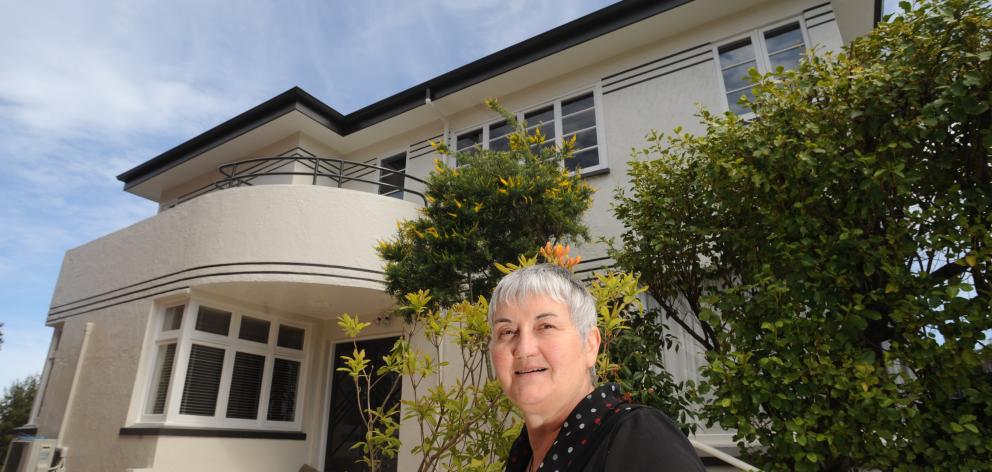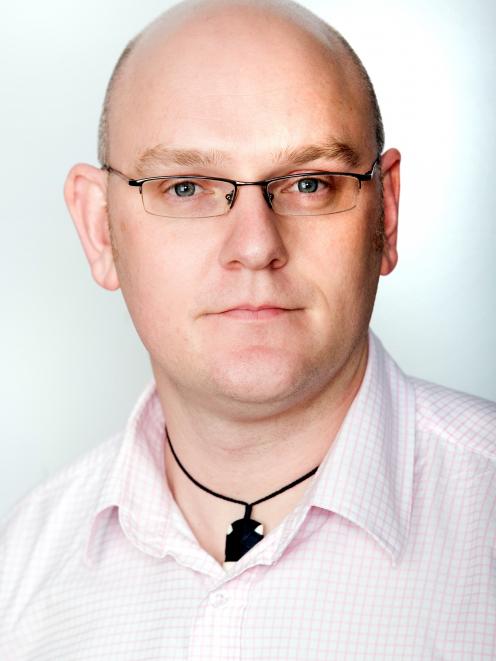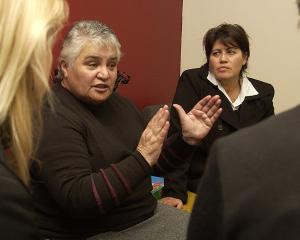Empathy deficit is prolonging a war on drugs that we lost long ago. That's the message from those demanding a better response to the harm caused by New Zealanders' increasing drug use, writes Bruce Munro.
He is a big man.
Tuari Potiki's broad, 183cm-tall frame takes possession of the leather armchair; his blue-jeaned, black-booted legs spilling outwards to occupy more space.
He has lived a big life.

The sleeves of the 55-year-old's suit jacket cannot hide all traces of the forearm tattoos bearing witness to deeds and states of mind not expected on the CV of the chairman of the New Zealand Drug Foundation, let alone the University of Otago's director of Maori development. It is a long way from night-time drug deals in the back streets of 1980s Wellington to this nicely appointed glass-walled corner office in the university's Centre for Innovation.
And he has a big dream.
For a decade, Mr Potiki has been actively campaigning for New Zealand drug policy to be turned on its head; to have health, not punishment, at its core. He says the war on drugs has been a spectacular failure. The fight for a more compassionate and effective solution is, and should be, highly personal, he says.
"That, for me, will be the buzz,'' Mr Potiki says. "If we can get things happening, so that Maori and others get through their adolescence without a conviction that potentially stuffs up the rest of their lives.''
It is an ambitious aspiration because it is a long way from reality. And it has been, for a long time.
United States president Richard Nixon launched the global "war on drugs'' in 1969, declaring drug abuse "public enemy number one''. The call to arms was picked up internationally through the United Nations.
In New Zealand, the Misuse of Drugs Act came into law in 1975.
But four decades on, the aim of a drug-free New Zealand as part of a drug-free world is no closer.
The US spends an estimated US$51billion ($NZ71billion) annually on combating drug use, disrupting supply and imprisoning drug users.
In New Zealand, between 2007 and 2011 alone, the war on drugs resulted in the convictions of almost 13,000 New Zealanders for minor drug offences.
Dealing with offenders is costly. During that period, about $59 million was spent on locking up people convicted of minor drug offences. More than a third of that was spent on imprisoning people under the age of 25.
Those figures do not include the costs to police, the courts, treatment and probation.
Despite waging a war, New Zealand has one of the higher drug-use rates in the developed world. The seminal Ministry of Health 2007-2008 New Zealand Alcohol and Drug Use Survey revealed that half the adult population has used drugs (excluding alcohol, tobacco and party pills) recreationally at some point during their lifetime.
Among young people the rate is considerably higher. The Christchurch Health and Development Study found that by the age of 25, more than three-quarters of young people had used illegal drugs. The national survey showed that one in six people over the age of 16 had used drugs recreationally during the past 12 months. That included 84% who drank alcohol at least once a week. Of illict drugs, cannabis was the most popular (14.6%). Methamphetamine use was about 2% and ecstasy use about 2.6%.
Synthetic psychoactive drugs - what used to be called legal highs - have not gone away. With the law change requiring manufacturers to prove the substances' safety, followed by a law change banning animal testing for psychoactive substances, the market has simply gone underground. There is a thriving synthetics black market, Mr Potiki says.
"In my view, and the Drug Foundation's view, the war on drugs is an approach that has failed miserably and quite spectacularly,'' he says.
"It's been acknowledged by President Obama and others as a failure. It hasn't worked anywhere. In fact, drugs worldwide, including in New Zealand, are now cheaper, stronger, more widely available and more widely used than ever before.
"Our view is that drugs, drug users and drug-use issues should primarily be viewed as health issues rather than criminal justice issues.''

SYSTEM NEEDS 'REJIGGING'
Claire Aitken concurs. Ms Aitken is programme director at Moana House, the nationally respected Dunedin residential therapeutic community for adult male offenders. Many of those who pass through its doors have a history of alcohol and drug abuse.
She says there are compelling reasons why most drug use is not best tackled by treating it primarily as a criminal-justice issue.
Some people use drugs, including alcohol, for pleasure or to be part of their peer group. And some drug offending means prison might be the best place for some people for a period of time.
"But many people who use drugs have underlying health and mental health issues,'' Ms Aitken says.
"And they are very strongly connected to poverty and social disparity, so the drug use is part of much bigger issues. It is never just isolated on its own.''
Looking at it in terms of outcomes, positive results do not come from just locking people up. "It's best addressed in an environment where the focus is on health and wellbeing.''
While Ms Aitken is pleased new government money has recently been allocated to drug treatment and intervention, especially of methamphetamine use, "the amount of money going into the Department of Corrections in prisons is just mind-boggling''.
"I think the overall system needs a bit of rejigging,'' she says.
There is a tendency for people to view drug issues too narrowly and through a criminal-justice lens, she says.
"Until it hits your family, you don't think about it a lot. But when it does, you start thinking, `It's not good what they did, but he or she has particular difficulties; can we get help for those, please'.''
For Mr Potiki, as a 13-year-old living in Bluff in the early 1970s, it was a cocktail of factors that led to his starting to drink alcohol and smoke cannabis.
There was a family history of addiction, his parents had recently separated, so he had shifted south from Wellington with his father, and it was just what everybody else around him was doing.
It did not help that a doctor prescribed him weight-loss pills that kept him awake and then added valium to help him sleep.
"It wasn't a particularly happy time,'' he says.
By the age of 20, Mr Potiki was using harder drugs. The distinctively New Zealand drug, "homebake'' - heroin produced by distilling morphine from codeine and adding other ingredients - was his drug of choice.
He had moved back to Wellington where he continued working, for a while.
"I couldn't get the drugs I needed, and do what I needed to do to get them, as well as holding down a job.
"You end up living in a different world. There is a night world that happens. During those using days I'd be sleeping during the day and then up at night scoring drugs or getting the money to get the drugs. Your life ends up being caught [up with] trying to score drugs or being out of it.
"What happens over time, though, is the drugs stop working. First you need more and more to get the same sort of effect and then eventually you're using just to feel normal. It's a horrible thing.''
The tattoos on both forearms disguise the scars of extensive self-harm that took place during this period.
"I still don't know why I did it. I've had lots of explanations. When I was on some of the drugs I didn't feel pain. That was part of it.
"I've had psychotherapists say when you're hurting inside you can't put a plaster on anything, but when you cut yourself you can see it and feel it, you externalise it.
"Sometimes I think it was because it was just a good way of keeping people away. Even some of the nasty buggers I hung out with then were wary of me.''
He racked up a bunch of convictions for a smorgasbord of offences. Then, in 1988, he ended up on the now-defunct residental drug rehabilitation programme in Hanmer, North Canterbury.
"When I was 27, a judge gave me a choice; going to jail or going to Hanmer. Because he could see I needed a health intervention, not a criminal-justice one,'' Mr Potiki says.
For the first time in 14 years he was drug-free. After leaving the programme there was a two-month relapse. But at the end of November, 1989, he stopped using drugs, including alcohol, and has not touched them since.
Building a new life was hard. But he had good support from the newly emerging Maori drug and alcohol community in Christchurch.
The "dark years'' of drug use became a positive as he trained and worked as a drug counsellor and then programme manager and course teacher. Mr Potiki also held national positions on drug and health-related organisations, including his present role as chairman of the Drug Foundation.
He spent several years as social development manager for Ngai Tahu Development Corporation, was a general manager for the Alcohol Advisory Council of New Zealand, and then, in 2012, moved to Dunedin to take up the Maori development role with the university.

There are many more former drug addicts than most people would believe who have left that life behind and are now middle-aged, in respectable, responsible jobs throughout New Zealand, he says.
Mr Potiki's offsider at the Drug Foundation is its executive director Ross Bell.
It is not those who believe drug law needs to be reformed who should have to defend that position, Mr Bell says.
"Those who support the status quo should be the ones defending why they think it is OK that the law doesn't change,'' he says.
"That law was designed 40 years ago to ... reduce drug use and drug problems. On any measure, that has not happened.''
Mr Bell says not only does New Zealand have high levels of drug use but there are a clutch of "glaring problems'' with the law itself.
"Giving someone a criminal conviction that lasts a lifetime for quite minor offences is unfair; the fact that there are alternatives police can and do use, but don't apply evenly; and, the fact that a whole lot of money from government is invested in enforcing the law - which means that more effective ways to reduce the problem through effective education and good treatment are under-invested in - so, the Government is now
mis-spending taxpayers' money.''
Mr Bell, and the Drug Foundation, supports a raft of changes.
"We think there is enough science now to support medicinal cannabis. But there are different schools of thought about how to deliver that medicine.''
He believes that in the long term, high-grade medicinal cannabis will become available. In the meantime, he thinks police should turn a blind eye to its use by people with severe pain or terminal illness.
''But how is that sourced? At the moment, it can only be sourced through the black market. That makes people very vulnerable.''
The foundation argues the criminal penalties for the use of soft drugs, such as cannabis and ecstasy, should be removed.
''For things like possessing cannabis, growing plants for yourself or trading cannabis without profit ... the criminal conviction does more harm than the drugs themselves.''
It does not support the commercialisation of cannabis because a profit-driven industry would be motivated to promote drug use.
There should also be age restrictions on soft drug use, just as there is on New Zealand's most popular and most damaging drug, alcohol.''So remove the criminal penalties, but then replace the criminal system with a health response, which is the Portuguese model.'' Portugal has 15 years of experience of decriminalising the possession of all drugs, Mr Bell says.
''But they have this whole health system ... where the money instead goes into prevention, it goes into education, it goes into treatment.
''If the police pick you up, you go in front of a committee of people who can assess whether you are a problem drug user or not.''Problem drug users get treatment. Recreational users get an education session or a civil penalty.
Mr Bell says there are important lessons to be learned from Portugal, given how long it has operated in this way.''Drug use went down. Overdose deaths went down. More people received treatment. Youth drug use went down. The prison population reduced.
There's a whole suite of lessons New Zealand can learn from Portugal.''Other countries have taken steps to end the war on drugs approach. Among them are Uruguay, which in 2013 legalised the production and sale of cannabis and regulated the sale price. Colorado is one of a few states in the US to have legalised cannabis. Next month, voters in at least nine US states will decide whether to legalise either the medical or recreational use of cannabis.
Australia has not decriminalised cannabis. But in most states, it has downgraded possession of small amounts to a ticketable offence, like a parking ticket.

DRUGS AND THE LAW
The Drug Foundation's views on reforming soft drugs mirror the public's. In August, the foundation released the results of a nationwide survey of attitudes to cannabis use and the law, which it had commissioned from regular National Party pollster David Farrar.
Almost two-thirds of respondents thought possessing a small amount of cannabis for personal use should be either legal or decriminalised. More than half supported growing for personal use; 79% were in favour of people being allowed to grow their own for pain relief; and, 82% supported growing for use in cases of terminal illness.
Efforts to catch illegal drug importers and other major players in the blackmarket drug industry should be maintained, Mr Potiki says. At the same time, reform is urgently needed. But the Government is ''disinterested'', he says.
Five years ago, the Law Commission reviewed the 40-year old Misuse of Drugs Act. It recommended a thorough overhaul that would have included decriminalising minor drug offences, improving access to treatment, government support for medicinal cannabis trials, new laws to ensure psychoactive party pills had safety tests, creating drug courts and increasing funding to courts for rehabilitative sentences.
In response, the Government ''cherry-picked'' the review, trialling a drug court in Auckland and requiring safety tests for new synthetic-high drugs, while ''pretty much shelving'' the rest of the report, Mr Potiki says.''So, the Government is missing the boat on that ... I think they are a bit out of step with the public on this one.''He says the only real voice for change within the Government is Associate Minister of Health Peter Dunne, leader of United Future.

The Otago Daily Times asked Corrections and Police Minister Judith Collins and Health Minister Jonathan Coleman why the Government continued to support a 40-year-old law that was a proven failure. It also asked whether some drugs should be decriminalised and resources diverted from enforcement to a health-focused response.
Both referred the questions to Mr Dunne.
Mr Dunne says New Zealand accepts the war on drugs has been a failure. He adds that the Government is making changes, such as an upcoming review of offences and penalties in the Misuse of Drugs Act.''That is why our policy is health-focused, and based on the principles of compassion, proportion and innovation,'' he says.
Mr Bell says Mr Dunne's response highlights the tension between the Government's good national drug policy and the obsolete drug law.''One is focused on health and the other is based on punishment,'' Mr Bell says.''At the end of the day, we need a majority in Parliament to vote for drug law reform and we don't have that yet.''The hold-up, it appears, is a lack of empathy. Mr Potiki predicts change will only come when people allow the issue of drugs to become personal.
In April, he was one of five people worldwide selected to speak on behalf of civil society at a United Nations General Assembly special session convened to examine the pressing issue of drugs and drug use. During the four-day assembly, representatives of all 193-member states, the majority of which support reform, each took their turn to state their position. Political manoeuvring by countries still waging the old war on drugs almost removed the five speakers' opportunity to address the gathering of global leaders.
In the end, Mr Potiki did get his five minutes at the podium. He closed his address with these words: ''If there is a war to be fought, and I believe that there is, it should be a war on poverty, on disparity, on dispossession, on the multitude of political and historical factors that have left, and continue to leave, so many people vulnerable and in jeopardy.
''We also need to acknowledge that the people we are here talking about are our sons, our daughters, our brothers, and our sisters.''
And if you think about how you would want your son or daughter treated if they developed a problem with drugs, then the way forward becomes very clear.''












